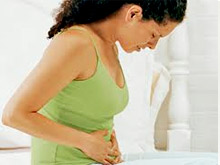Health Topics
-
Healthy Living
-
|
|
November 2009
|
| Painful Periods |
| Dr Usha Bohra |
| |
 |
Children's Day assumes more importance every passing year, as the pressures on the child accumulate in an increasingly unforgiving society, and even family. The child – and being one - is celebrated on November 14th, in India. But the in-between years, the transition from childhood to adulthood is filled with anxieties and troubles, of not knowing how to accept |
what is happening to them. Many teenage girls are reported to hate their periods. Many of them have painful periods. In fact, over 50 percent of teenage girls complain of menstrual cramps or spasmodic dysmenorrhoea. And five to ten percent of adolescent girls can have a severe pain causing them to miss the school/college.
Menstrual cramps mostly begin at about age 15 and miraculously, almost always disappear at 25 or 30 years. Curiously, most sufferers break free of the malady after they are married and raise children. Till then, it is always a good idea not to worry too much about it and adopt some sensible remedies. 20 percent of those with dysmenorrhoea also report that their mother or sister also had similar problems.
Symptoms
Classically in primary dysmenorrhea, there is a lower abdominal pain, which starts with the actual menstrual flow — never before - and lasts for a few hours or days. The pain is felt chiefly in the pelvis and lower back, and it sometimes also spreads to the legs. It can be considerably severe and may be continuous. Nausea and vomiting are fairly common, and one may also feel very weak and faint. Secondary dysmenorrhoea usually begins before menstruation and lasts for the duration of bleeding.
The probable cause for these cramps is the sudden tightening in the blood vessels that supply blood to the uterus because of release of a certain chemical. This leads to diminished blood and oxygen circulation in this area. Metabolism does not happen well in the uterus and pelvic muscles in this condition. Waste products of metabolism, such as carbon dioxide and lactic acid build up, intensifying the pain and discomfort.
Treatment
There is a substantial ignorance and misinformation among the teenagers regarding the cause and treatment of dysmenorrhoea. A simple explanation of the reason and that of the treatment should be able to reassure those suffering from this condition. Some simple measures can provide big relief.
- Be Active: Girls who are sedentary run an increased risk of suffering from menstrual cramps. Those who continue doing physical activity and participate in sports and outdoor activity suffer less.
- Eat Healthy: Maintaining good nutrition, avoiding junk food and taking natural foods in sufficient amounts help in a big way. Such habits check constipation, which is known to worsen menstrual cramps.
- Avoid Obesity: Overweight girls are known to have stronger and more persistent menstrual pain.
- Rest Well: Adequate rest at night is also useful. It equips the body to function in a better and more normal fashion.
- Avoid Stress: Good menstrual hygiene is also necessary. Always think of menstruation as a healthy and clean process. This would do you a world of good! Conversely, too much of unnecessary worry can only add to the tension in the muscles and worsen the cramps.
Relief Measures
- Lying down with a hot water bottle helps in most cases.
- If that is not possible, then a simple analgesic pill may be taken. Any analgesic pill will usually bring prompt, efficient relief from pain and discomfort. You may take the one you prefer, either on prescription from your physician, or over the counter from your chemist. Aspirin and Paracetamol are most commonly used. Their use for half to one day is often adequate. Those with the problem on a recurring basis should carry tablets with them when trouble is anticipated.
- Try antispasmodics. These medications are to be used only on a doctor's prescription, and must be taken under correct medical supervision. They relieve spasm of the uterine muscle.
- If nothing seems to work, then a doctor should be consulted.
|
 |
Dr. Usha Bohra is Consultant - Gynaecology at Apollo Hospitals, Ahmedabad |
|
|